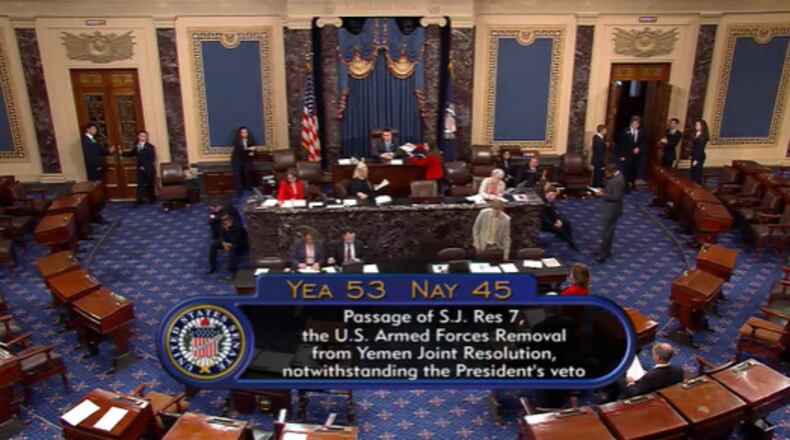The vote to override was 53 to 45, which was 13 votes short of the required margin.
The effort to "direct the removal of United States Armed Forces from hostilities in the Republic of Yemen that have not been authorized by Congress" was a rare instance in which lawmakers tried to invoke the War Powers Resolution, which was approved in 1973 in the backlash against the Vietnam War.
I support @RealDonaldTrump’s veto of the Yemen war powers resolution. This resolution is unnecessary & it would have dangerous consequences, leaving Americans in the region susceptible to Houthi missile attacks. I urge my Dem colleagues not to risk American lives with this vote.
— Jim Inhofe (@JimInhofe) May 2, 2019
This is about "getting the blood off of our hands," @ChrisMurphyCT says re: the Senate's upcoming vote to override @realDonaldTrump's veto of Yemen war powers bill. "The United States should never willingly be part of a bombing campaign that results in this kind of starvation."
— Deirdre Shesgreen (@dshesgreen) May 2, 2019
"The magnitude of the suffering in that country is literally unimaginable," Sen. Bernie Sanders (I-VT) argued in vain on the Senate floor. "The United States involvement in this war in clearly unconstitutional."
“I just came back from the region where I received maybe the most disturbing briefing I have ever received on Yemen in which our humanitarian agencies there told me that there are 250,000 Yemenis today that are starving and are likely beyond saving,” said Sen. Chris Murphy (D-CT).
But backers of the President say the 'narrow and focused' U.S. military support for Saudi Arabia was a perfectly logical use of Pentagon assets.
"Our troops are not co-belligerents in the conflict," said Sen. Jim Risch (R-ID), the Chairman of the Senate Foreign Relations Committee.
Still, Risch and others publicly grumbled about the state of American relations with Saudi Arabia, which tumbled after the murder - and subsequent government cover up - of a Saudi journalist last year, an action pinned directly by many on Saudi leaders.
On my way to the floor where I’ll vote to OVERRIDE @POTUS’ heartless veto of our bipartisan bill to end support for the Saudi-led war in Yemen.
— Tom Udall (@SenatorTomUdall) May 2, 2019
Why does @POTUS want to continue turning a blind eye to this humanitarian catastrophe victimizing civilians & children?
While the removal resolution had been approved by both the House and Senate, it was far short of the numbers needed for a veto override; the House okayed the plan 247-175 on April 4. The Senate voted 54-46 for it back on March 13.
“It is long past time that we end U.S. involvement in this unauthorized, unjustified, and immoral war that has caused immense human suffering,” Sen. Mike Lee (R-UT) argued at the time.
But in his veto message, President Trump rebuffed the Congress, saying the U.S. is not directly engaged in hostilities in Yemen, other than needed counterterrorism operations.
"This resolution is an unnecessary, dangerous attempt to weaken my constitutional authorities, endangering the lives of American citizens and brave service members, both today and in the future," the President wrote.
"We cannot end the conflict in Yemen through political documents," Mr. Trump added, saying the move by Congress would 'harm the foreign policy of the United States.'
Mr. Trump's first veto blocked an effort by Congress to roll back his national emergency declaration along the southern border of Mexico, which authorized the movement of several billion dollars in military construction accounts to be used to build a border wall.
As with today's action on the Yemen resolution, a vote on the border declaration also failed to gain the needed two-thirds majority for a veto override.
About the Author
